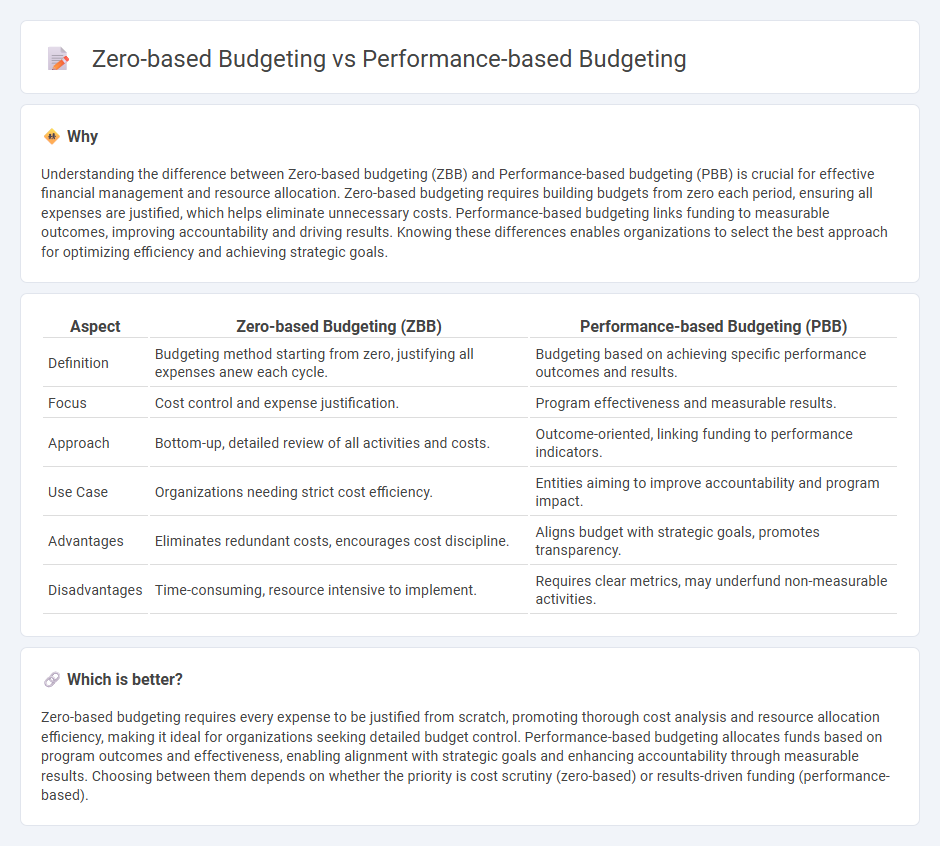
Zero-based budgeting requires justifying all expenses from scratch for each new period, promoting rigorous cost control and efficient allocation of resources. Performance-based budgeting allocates funds based on achieving specific outcomes and measurable results, aligning spending with organizational goals and performance targets. Explore the differences between these budgeting methods to optimize your consulting strategy.
Why it is important
Understanding the difference between Zero-based budgeting (ZBB) and Performance-based budgeting (PBB) is crucial for effective financial management and resource allocation. Zero-based budgeting requires building budgets from zero each period, ensuring all expenses are justified, which helps eliminate unnecessary costs. Performance-based budgeting links funding to measurable outcomes, improving accountability and driving results. Knowing these differences enables organizations to select the best approach for optimizing efficiency and achieving strategic goals.
Comparison Table
| Aspect | Zero-based Budgeting (ZBB) | Performance-based Budgeting (PBB) |
|---|---|---|
| Definition | Budgeting method starting from zero, justifying all expenses anew each cycle. | Budgeting based on achieving specific performance outcomes and results. |
| Focus | Cost control and expense justification. | Program effectiveness and measurable results. |
| Approach | Bottom-up, detailed review of all activities and costs. | Outcome-oriented, linking funding to performance indicators. |
| Use Case | Organizations needing strict cost efficiency. | Entities aiming to improve accountability and program impact. |
| Advantages | Eliminates redundant costs, encourages cost discipline. | Aligns budget with strategic goals, promotes transparency. |
| Disadvantages | Time-consuming, resource intensive to implement. | Requires clear metrics, may underfund non-measurable activities. |
Which is better?
Zero-based budgeting requires every expense to be justified from scratch, promoting thorough cost analysis and resource allocation efficiency, making it ideal for organizations seeking detailed budget control. Performance-based budgeting allocates funds based on program outcomes and effectiveness, enabling alignment with strategic goals and enhancing accountability through measurable results. Choosing between them depends on whether the priority is cost scrutiny (zero-based) or results-driven funding (performance-based).
Connection
Zero-based budgeting and performance-based budgeting are connected through their focus on optimizing resource allocation by evaluating actual needs and outcomes rather than relying on historical expenditures. Both methodologies require detailed analysis of activities and performance metrics to link budget decisions directly to organizational goals and results. This alignment enhances efficiency and accountability in consulting projects by ensuring funds are allocated based on justified activities and measurable performance indicators.
Key Terms
Resource Allocation
Performance-based budgeting allocates resources based on program outcomes and efficiency metrics to ensure funds support high-impact activities, enhancing accountability and strategic goal achievement. Zero-based budgeting requires justifying every expense from scratch each cycle, promoting cost-efficiency and flexible resource allocation by eliminating outdated or non-essential expenditures. Explore deeper insights on how these budgeting approaches optimize resource allocation in diverse organizational contexts.
Cost Justification
Performance-based budgeting emphasizes the allocation of funds based on measurable outcomes and efficiency metrics, ensuring that spending aligns with strategic goals and service delivery improvements. Zero-based budgeting requires each expense to be justified from scratch, promoting a rigorous cost justification process that avoids automatic budget increases and enhances cost control. Discover how these budgeting models optimize financial management by visiting our detailed guide on budgeting techniques.
Outcome Measurement
Performance-based budgeting allocates resources based on specific outcomes and measurable results, enhancing accountability and efficiency in public sector spending. Zero-based budgeting requires every expense to be justified from scratch, promoting thorough evaluation but often demanding more time and detailed analysis. Explore these budgeting approaches further to optimize your organization's financial planning and outcome measurement strategies.
Source and External Links
Performance-Based Budgeting: Everything You Need to Know - Fyle - Performance-based budgeting allocates funding based on the achievement of specific, measurable goals and outcomes, aiming to improve resource effectiveness and efficiency by linking financial decisions to performance results.
Performance-based budgeting - Wikipedia - This budgeting method develops budgets based on the relationship between program funding and expected results, using a results-oriented framework to allocate resources according to objectives and measured outcomes.
Neubrain - Performance-Based Budgeting and Reporting - Board - Performance-based budgeting, also known as outcome budgeting, links public program funding to the benefits they deliver, using key performance data to monitor progress and adjust allocations for greater transparency and efficiency.
 dowidth.com
dowidth.com